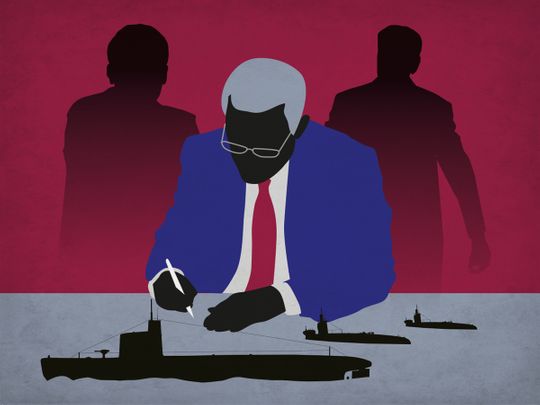
The newly announced military pact among three Anglosphere countries — Australia, the US and the UK (AUKUS) signals the US moving a notch higher in raising its strategic stakes against China.
The immediate consequence of the announcement was that the US will share its nuclear-powered submarine technology with Australia in building eight nuclear powered submarines. In process, Canberra has cancelled nearly $60 billion 12 submarine order to the French.
Within Australia the reactions reflect the ideological divide in a country that remains split between the Liberals (actually Conservatives) who seek comfort in Australia’s relations with Britain and the US.
The other group, largely constituting the Labor party supporters, and those who believe that Australian foreign policy should align with the regional realities, have questioned the wisdom of entering into a military alliance with countries afar that is bound to ratchet up tensions with China.
Paul Keating, a former Labor Prime Minister condemning the pact criticised the current government for “falling back, yet again, to do the bidding of another great power, the United States of America.” China, he added “does not attack other states, unlike the United States which does attack other states”.
In addition to increased military integration with the US, the pact draws Australia into foreign policy alignment with the US. Consequently, the US expectation of Australian support in any situation, whether it involves China or not, will grow.
The Association of Southeast Asian States (ASEAN — a 10 nations regional grouping) who have over the years, established themselves as a successful bloc, central to the politics of the region are naturally concerned at this development. It could subsume the area within the larger competition, displace it from its position of centrality and erode its strategic autonomy.
Setting up of a new military alliance led by extra-regional powers will affect ASEAN’s standing as a primary bloc in the region. The region will come under further American pressure to take America’s side in its competition with China.
Economic engagement with China
ASEAN may have its differences with China especially over the South China Sea, and yet because of economic engagement with China is reticent in enlisting as part of anti-China coalition sought by the Americans.
Rising China brings them prosperity through trade and investments. They do not therefore, want to be forced take sides. Only time will tell how far the balance of power changes because of this announcement.
China understandably condemned AUKUS, but in emphasising its economic strengths China lodged its application to join the Comprehensive and Progressive Agreement for Trans-Pacific Partnership (CPTPP), the successor pact to Trans Pacific Partnership (TPP), a day after the launch of AUKUS.
America jettisoned TPP under Trump. Though China’s accession to the treaty is not guaranteed, the fact is that the US has chosen to stay out of two of the largest economic partnerships spanning the Pacific and the Indian Ocean regions highlights how the two conceive of competition in Asia.
Europe feels cheated again. After four years of Trump’s antics they perhaps, trusted Biden’s ‘America is back’, hoping that America was serious in rebuilding ties. AUKUS demonstrates that America has ditched Europe in pursuit of its own interests elsewhere.
So, Trump’s downplaying Nato was only a forewarning that the US’ interests lay elsewhere. His demeanour masked what was coming as America’s policy.
The French fury
The French have been hurt particularly with the cancellation of their largest ever military contract. “This unilateral, brutal, unpredictable decision is very similar to what Mr. Trump was doing,” said the French Foreign Minister Jean-Yves Le Drian.
The American obsession with a security driven foreign policy in becoming more and more evident. This demonstrates a weakening of American belief that it can take on its adversaries independently and diplomatically.
Faced with such a situation when Soviet Union was the nemesis, America first shared its nuclear submarine technology with Britain in 1956.
Now obsession with China’s peaceful rise has compelled America to make an offer to Australia that it could not refuse. The world should not be surprised when the US seeks upgrading these submarines from nuclear powered to nuclear armed, which goes against the basic tenets of the NPT.
Unable to match the Chinese economic commitments, AUKUS reinforces the belief that the US alliances abroad are driven by the military-industrial complex at the expense of more durable and beneficial economic partnerships.
Sajjad Ashraf served as an adjunct professor at the Lee Kuan Yew School of Public Policy, National University of Singapore from 2009 to 2017. He was a member of Pakistan Foreign Service from 1973 to 2008 and served as an ambassador to several countries.







